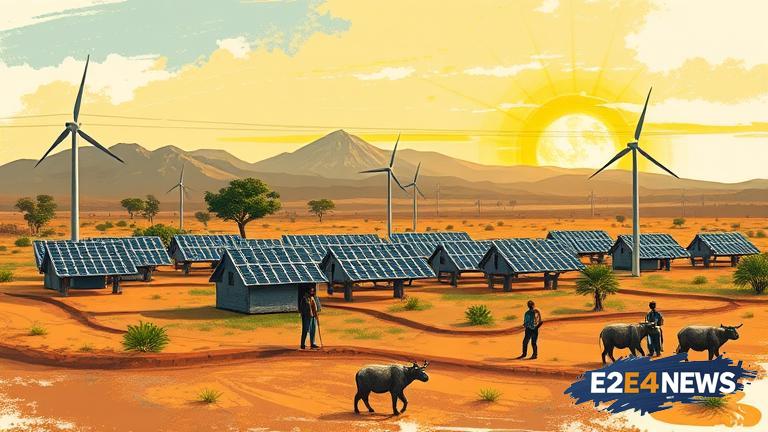The African continent is witnessing a significant shift towards renewable energy, driven by the need to address the pressing issues of energy access, energy security, and climate change. With a growing population and increasing economic activities, the demand for energy is on the rise, and renewable energy is emerging as a viable solution. Solar and wind power are the most prominent forms of renewable energy in Africa, with countries like South Africa, Egypt, and Morocco leading the way. The cost of renewable energy technologies has decreased dramatically over the years, making them more competitive with fossil fuels. This has led to an increase in investments in the renewable energy sector, with many international companies and organizations committing to support Africa’s energy transition. The African Union’s Agenda 2063 and the United Nations’ Sustainable Development Goals (SDGs) have also played a crucial role in promoting renewable energy in Africa. Many African countries have set ambitious targets to increase their share of renewable energy in the energy mix, with some aiming to reach 100% renewable energy by 2050. The benefits of renewable energy are numerous, including reduced greenhouse gas emissions, improved air quality, and enhanced energy security. Moreover, renewable energy can create jobs, stimulate local economies, and contribute to poverty reduction. However, despite the progress made, there are still significant challenges to be addressed, including the lack of infrastructure, limited access to financing, and inadequate policy frameworks. To overcome these challenges, African countries need to develop and implement effective policies and regulations that support the growth of the renewable energy sector. International cooperation and knowledge sharing can also play a vital role in accelerating Africa’s energy transition. The private sector has a critical role to play in driving the growth of renewable energy in Africa, and many companies are already investing heavily in the sector. Governments, on the other hand, need to create an enabling environment that attracts investments and supports the development of renewable energy projects. The African Development Bank, the International Renewable Energy Agency (IRENA), and the United Nations Development Programme (UNDP) are some of the organizations that are actively supporting Africa’s renewable energy development. In addition to solar and wind power, other forms of renewable energy, such as hydro, geothermal, and biomass, are also being explored in Africa. The potential for renewable energy in Africa is vast, and with the right policies, investments, and technologies, the continent can become a leader in the global renewable energy market. As the world transitions towards a low-carbon economy, Africa has the opportunity to leapfrog traditional fossil fuel-based development and embrace a cleaner, more sustainable energy future. The renewable energy revolution in Africa is not only a matter of environmental sustainability but also of economic development and social justice. By harnessing the power of renewable energy, Africa can create a brighter future for its people, reduce poverty and inequality, and contribute to global efforts to combat climate change. In conclusion, Africa’s renewable energy revolution is gaining momentum, driven by a combination of factors, including declining technology costs, increasing investments, and supportive policies. As the continent continues to transition towards a low-carbon economy, it is essential to address the remaining challenges and ensure that the benefits of renewable energy are shared equitably among all Africans.
